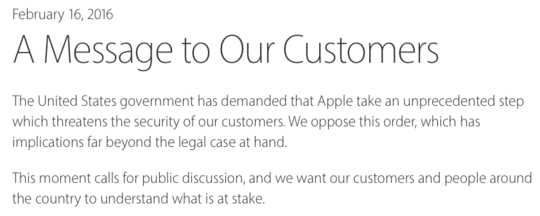Judge Issues Order to Apple to Unlock iPhone Vital in the San Bernardino Shooting Case — Apple refuses to follow orders
The ruling judge in the San Bernardino shooting case, US Magistrate Judge Sheri Pym, issued an order to the technology giant to find a way to bypass the iPhone’s security mechanism and thereby provide help in acquiring evidence required to close the case.

The San Bernardino attack, which took a toll of 36 victims, 14 of whom were murdered, was allegedly planned by Syed Farook and his wife, Tashfeen Malik. Over the course of the investigation, Farook’s iPhone 5C was seized as evidence, but will not be considered sufficient unless it is unlocked using any method available.
The ruling, however, was not sufficient to convince the company to find a suitable way to unlock the perpetrator’s phone. On the one hand, the encryption policy used by the iPhone is designed so that no one, other than the user himself, can break the encryption and subsequently unlock the phone.
“Our new iPhones are impossible to hack: Apple”
The reason, as explained by Apple, is very simple: the unlock combination chosen by the user is embedded in the encryption key that is part of Apples Data Protection security protocol, and, therefore, the mechanism cannot be broken into without knowledge of the password combination.
In light of the fact that Apple phones have an auto-destruct feature which erases the phone’s hard drive if 10 wrong password combinations are attempted consecutively, and thus makes the data completely inaccessible. According to The Hacker News, the judge’s ruling stipulated that Apple should create a ‘backdoor mechanism’ that would bypass the security system and increase that number of attempts to millions, thus effectively allowing the system to be broken by attempting any combination of digits.
Although Apple did not make any claims as to whether bypassing the security system is plausible, the implications of allowing such a mechanism to be created are enormous: it would provide a way for government agencies to unlock any individual’s iPhone within a matter of hours.
Tim Cook, the CEO of the company, wrote a customer letter strongly opposing the judge’s ruling: “

“We have great respect for the professionals at the FBI, and we believe their intentions are good. Up to this point, we have done everything that is both within our power and within the law to help them. But now the U.S. government has asked us for something we simply do not have, and something we consider too dangerous to create. They have asked us to build a backdoor to the iPhone.”
The tech world stands in agreement with Apple on this case: creating a system which could effectively become a master key for any iPhone is a grave and dangerous step. It would allow not only government agencies, but a number of other interested parties to have an easy way into unlocking other phones, and, therefore, could easily be misused.
Cook’s attitude remains fair yet unyielding throughout his address to the public. He maintains that his company would be happy to provide assistance to the government and law enforcement in the resolution of the heinous crime, but that the assistance must and will remain within the bounds of valid subpoenas and search warrants, thus remaining reasonable and safe.
With many top-tier smartphone manufacturers being issued similar requests and orders, the future of mobile encryption and, by extension, personal privacy, remains unstable. Apple’s standing on this matter is a strong answer to pressures from governments, but it is still an open question if the company will not suffer legal repercussions for taking a stand.
Earlier this year, FBI Director James Comey also expressed his concern about Apple and Google encrypting their devices. Comey claimed such encryption helps criminals and terrorists. However, it looks like Apple won’t back up easily.
